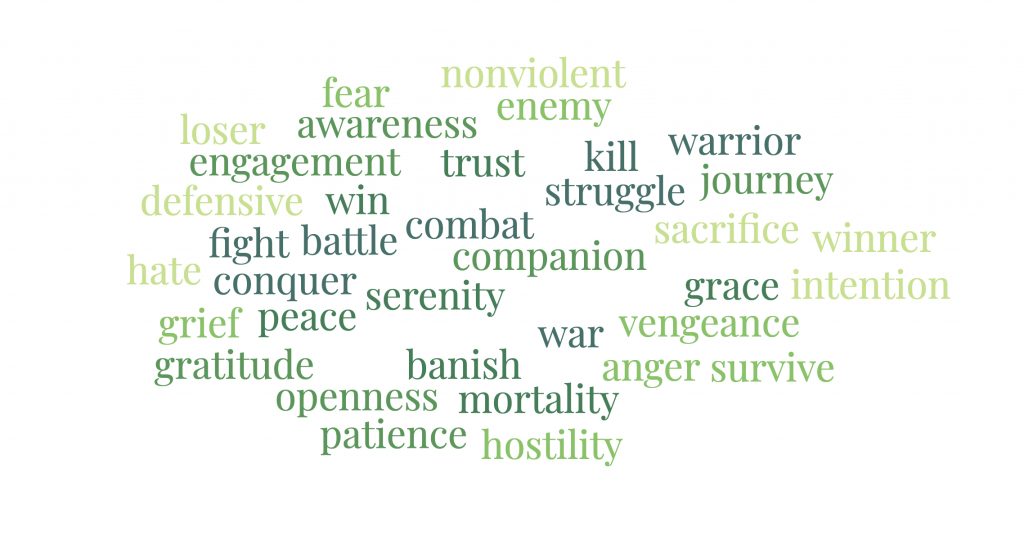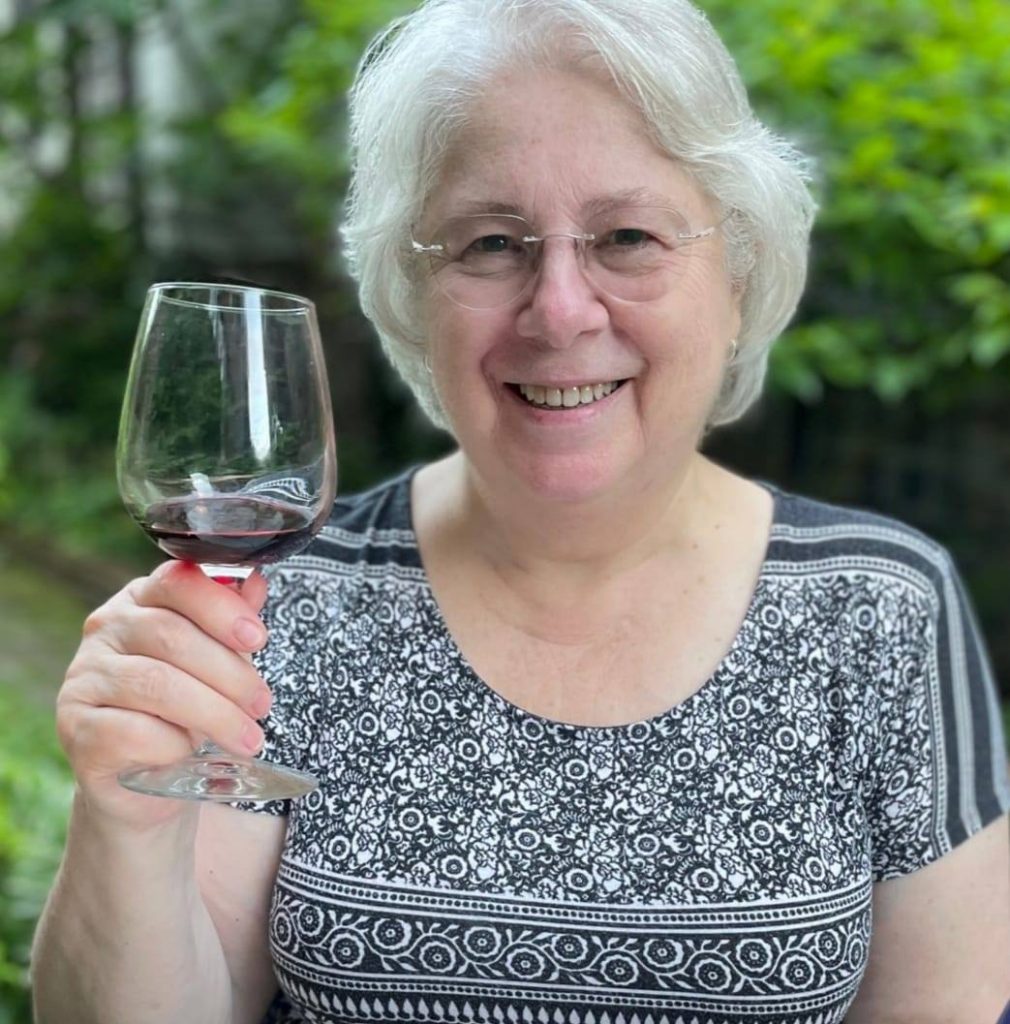By Marisa Guerin, PhD
I have long been struck by the language of war and violence that is associated with cancer, but it hasn’t been a personal concern…. until now. A few months ago, I was diagnosed with multiple myeloma, a cancer of the blood plasma, and I now find myself sorting through my feelings about this reality. Does the language of war fit for me? Is it possible to have a nonviolent relationship with cancer? With my mortality?

You know the violent words I’m talking about: conquer, combat, kill, battle, fight, struggle, war, warriors, and such. They show up all the time in connection with cancer – almost a default setting, both for patients and for medical professionals. And why not? I understand that for many people, including dear friends and family members, coping with cancer involves leaning into the energy of battling it with everything they’ve got. I respect that this is right for them, and I am also grateful for the efforts of medical researchers who are working hard to cure, prevent, or eradicate cancer. That’s a worthy effort that can help many people to have more of a full life span.
However, the aversion and resistance in my own reaction to the idea of being a warrior cues me to recognize that the imagery of fighting and conflict is probably not my own way. The violence in the language makes me wince as if I were at war with my own body. What I would like to explore here is a way of thinking, feeling, and speaking about having cancer that might be more nonviolent. I’m looking for a way to realistically confront cancer as a problem to be addressed, versus fostering an adversarial relationship with my cancer as an enemy.
“Making” Enemies
The more I have learned about nonviolence over the years, the more I appreciate the internal attitude that is at its heart. Obviously, actions that involve injuring, maiming, or killing others are violent; but the violence is stirred up in the first place by feelings of hostility, fear, vengeance, or hate towards another, the “enemy.” By contrast, a nonviolent stance can involve actions that are defensive, protective, containing, or self-sacrificing, but what nonviolence does not involve is the “making” of an enemy.
Recognizing a force that is opposed to my own interests – as cancer would be – is a cognitive process, but interpreting that opposing force, or person, as an enemy is an emotional and psychological process. An enemy, by definition, deserves my anger, contempt, and hate. When I “make” an enemy, I am seeing in another something of myself that I’d rather not recognize, such as my potential to feel murderous rage. Putting my own capacity for violence into someone or something else lets me judge them as evil and deserving of my hostility and aggression. I hunker down into battle-stance.
Of course, sometimes people actually are intending to harm us and we must do what we can to protect ourselves, hopefully without reciprocating the violence. But whether we make those who oppose us enemies or not is an interior choice. It is not necessary to feel hate, even if I must take defensive action.
Is Cancer an Enemy?
So, is cancer a problem? Yes, a big one. Is it also my enemy?
Cancer is a disease that seriously threatens my well-being and that could be fatal if left unaddressed. This true threat – that cancer or another incurable disease can and will lead to death – is what makes it such a ready target for making into an “enemy.” The idea of cancer being an enemy brings violent intention into the picture. It is as if the cancer is actively trying to kill me, that bears me ill will – that it is not just a colony of malignant cells, but a malignant opponent living in my body and putting me in its sights. This is an easy stance to fall into. Few things trigger more fear than a diagnosis of cancer.
But the fact is, cancer is not my enemy, it is not a conscious entity that is trying to do me in. Cancer has no mind or thoughts – but it is a problematic physical change in my body. The mutated cells in my blood plasma have deviated from their original protective mission. They are replicating uncontrolled, and in so doing are producing malign consequences, not beneficial ones. These cancer cells are lost. They are no longer in alignment with the body’s plan and design for health. If they are left alone, their proliferation will result in my sickness and death. My own body was designed from the get-go with an amazing immune system that is primed to notice defective entities and to neutralize them or eliminate them. When this is happening in my body, there is no emotional process at work. Just simple survival calculations, from eons of evolution.
After all, even though it looks to us humans like a hostile interaction, there is no violent intention in the natural world of predator and prey, in the evolutionary process of survival of the fittest. We read our own human feelings into what we see, but Mother Nature is a grand, complex dance of life and death that is woven together into an ancient, living planet. Everything belongs, even when we can’t see how or why. So, no – there is no hatred, hostility, or intentional violence at work in nature, and that applies to cancer, too. Cancer is not my enemy.
Be sure to check back tomorrow for part 2 of this important blog where Marisa will share her tips for treating cancer without a violent spirit.

Marisa Guerin, PhD, is retired from a career that spanned three phases: first, as Director of the national office for national Catholic youth ministry; second, as Vice President of Human Resources for a major international manufacturing company; and third, as President of her own consulting company, providing support to businesses and nonprofit organizations on issues related to management, strategy, and leadership. Marisa holds a doctorate in Human and Organizational Systems and served for five years on the Project Faculty of the Wharton Global Consulting Practicum. A native of the Philadelphia area, Marisa lives in West Philadelphia with her husband, Mike Sweeney. Marisa was diagnosed in August 2021 with Multiple Myeloma.
Thank you, Marisa. I am an 80 year old woman who was diagnosed with maxillary sinus cancer in January of 2017. Like you, I do not like the “enemy” or warlike designations used to describe cancer and its treatment so your words are very refreshing.
Requiero saber más sobre Tratamiento de cáncer Colón metastasico, que ha fracasado a tratamientos convencionales de: 5 Fluoracilo, Oxaliplatino, Capecitabina más bebacizumab
This is a good resource but you will have to use a screen translator to get it in Spanish – Este es un buen recurso, pero tendrá que usar un traductor de pantalla para obtenerlo en español.
https://www.uptodate.com/contents/colorectal-cancer-treatment-metastatic-cancer-beyond-the-basics/print